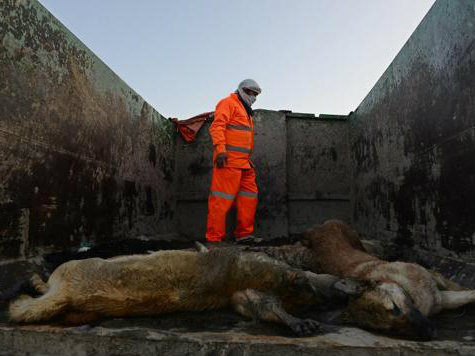(AFP) — Cornered against a wall and with a steel hook pushed around his neck, the dog emits a savage howl in a desperate attempt to fight free, but poison will soon be forced into his mouth as Kabul’s cull of strays claims another kill.
About 17,600 dogs were poisoned last year by municipal workers in the Afghan capital in an effort to protect residents from disease and to control the rocketing population of canines that roam the city’s streets and open ground.
The method of killing is brutally effective.
Teams of dog-catchers wearing orange suits use long steel hooks, wooden bars and large nets to ensnare their prey with practised skill.
A heavy boot is put on the dog’s neck, and a spoon is used to press deadly strychnine into the mouth and gums.
Then the dogs are tied to ropes, and die within an hour in spasms of agony.
Alternatively, poisoned meat is left out at night and by morning the ground is littered with corpses.
The dogs, sometimes showing the final flickers of life, are thrown into the back of a truck and dumped on waste tips on the city outskirts.
Like many residents in the Pul-e-Charkhi neighbourhood where he works, Islamuddin has no qualms about killing dogs as part of a city policy that is widely seen as a necessary health precaution.
– Rabies risk –
It is uncertain how many strays have rabies in Kabul, but the disease is much feared as it is often fatal to humans if they are bitten or scratched by an infected dog.
Riaz Gul, from the nomadic Kuchi tribe that has a small camp in Pul-e-Charkhi, believes his 12-year-old son’s recent death was caused by a dog bite.
Wherever the dog-catching team works, locals gather to watch the animals be trapped, poisoned and then die a slow death.
Dogs are regarded as unclean in Islam, and in Afghanistan they are generally only kept as guard dogs or for organised dog fights rather than as domestic pets.
– Neutering solution? –
Ghori said plans to neuter dogs to stop breeding or to launch a rabies vaccination programme were being considered in consultation with veterinary and health officials, but no other practical solution was currently available.
Animal welfare experts dismiss the cull as wantonly cruel — and futile.
One Kabul resident, Ghazal Sharifi, a dentist, told AFP how she had befriended a stray dog that had six puppies near her workplace — and one day she discovered them all being poisoned.

COMMENTS
Please let us know if you're having issues with commenting.